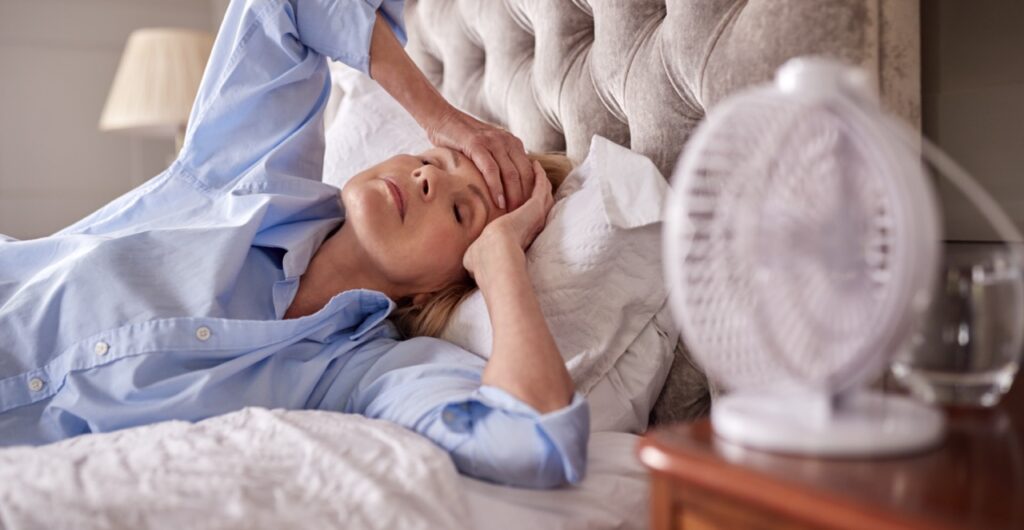If you’re looking for tips to manage menopause and perimenopause symptoms, this blog will help. Perimenopause and menopause bring significant changes in a woman’s physical and mental well-being. Some of the symptoms include gastrointestinal issues, mood changes, headaches, insulin resistance, weight and body composition changes, autoimmune disorders, brain fog, anxiety, poor sleep, hair loss, heart palpitations, dry eye, dry mouth, skin problems, changes in genital and urinary function, and more.
Addressing menopausal symptoms requires lifestyle changes. There is no one-size-fits-all solution. Adopting a proactive approach to health can make a significant difference, according to Board-Certified Health And Wellness Coach Dr. Darlene Thomas.

Here are some straightforward tips to help you navigate through this transformative journey:
Eat A Healthy Balanced Diet

Adopting a balanced healthy diet that includes nutrient-dense, anti-inflammatory foods is crucial. Meals and snacks should include a balance of protein, fiber, healthy fats, and colorful vegetables, which provides essential macro and micronutrients for improved digestion. Prioritize foods rich in omega-3 fatty acids, such as fatty fish, seeds, oils, and nuts.
Include low-glycemic fruits, vegetables, whole grains, plant-based dairy, and beans in your diet. Aim for a daily fiber intake of 25 grams. Incorporate protein-containing foods like lean meats, poultry, and legumes to enhance fullness and manage blood sugar levels.
Reduce Refined Sugar and Processed Foods
Reduce refined sugar and processed foods because they can worsen hormonal imbalances and contribute to weight gain. Opting for natural sweeteners and avoiding heavily processed foods can make a significant difference. Focus on the healthy diet tips outlined above. This approach supports hormonal balance, helps manage weight, and improves overall health.
Exercise Regularly


Maintaining lean muscle mass is crucial during menopause because muscle mass tends to decrease while fat levels increase with age. This decrease in muscle mass leads to a drop in metabolism and an increased risk of weight gain. To counteract this, engage in regular cardiovascular exercises to help boost metabolism.

Strength and interval training are also especially beneficial during menopause because they help burn calories and fat more effectively than traditional workouts. They are also good for overall well-being. Devote about 150 minutes a week for these types of exercises.

Manage Weight

Maintaining a healthy weight is essential during menopause because of its impact on metabolism and body composition. Hormonal changes can also influence weight gain. Regular physical activity and a balanced diet support weight control. This also helps minimize the risk of developing conditions associated with excess weight, such as cardiovascular issues and joint problems. Mindful eating is another way to manage your weight.
Manage Stress and Anxiety

Proactively addressing mood and anxiety changes during menopause and perimenopause is crucial. This empowers women to embrace this period with a sense of control and well-being, which promotes a smoother and more fulfilling transition. It also fosters a positive mental health outlook and enhances resilience and adaptability.
Hormonal fluctuations can significantly impact emotional well-being, leading to mood swings, irritability, and increased anxiety. By recognizing and addressing these changes early, you can implement effective coping strategies, such as seeking support from health and wellness professionals.
The hormonal changes can also contribute to increased stress levels, and chronic stress may worsen menopausal symptoms. Effectively managing stress is a crucial aspect of promoting well-being during menopause and perimenopause. Stress management techniques such as mindfulness, meditation, other relaxation techniques, and regular exercise can play pivotal roles in alleviating the physical and emotional stress associated with this transitional phase.
Stay Hydrated

Adequate hydration is crucial during menopause and perimenopause. Hormonal changes can lead to increased susceptibility to dehydration, making it essential to replenish fluids regularly. Water helps regulate body temperature, supporting digestion and ensuring proper organ function. Including water-rich foods and herbal teas in your diet can contribute to optimal hydration.
Consider Nutritional Supplements

Some women have reported relief from hot flashes when taking some supplements. Taking supplements has also shown promise in improving anxiety, irritability, and nervous tension.
Dietary supplements commonly considered for menopause symptoms include:
Plant Estrogens
Asian women, who consume soy regularly, are less likely to report hot flashes and other menopausal symptoms than women in other parts of the world. One reason might be related to the estrogen-like compounds in soy.
However, studies have generally found little or no benefit with plant estrogens, although research is ongoing to determine whether specific components of soy, such as genistein, help hot flashes.
Black Cohosh
Black cohosh has been popular among many women with menopausal symptoms. Studies of black cohosh’s effectiveness have had mixed results, and the supplement might be harmful to the liver in rare circumstances.
Ginseng
While ginseng may help with mood symptoms and insomnia, it doesn’t appear to reduce hot flashes.
Dong Quai
Study results indicate that dong quai isn’t effective for hot flashes. This supplement can increase the effectiveness of blood-thinning medications, which can cause bleeding problems.
Vitamin E
Taking a vitamin E supplement might offer some relief from mild hot flashes. In high doses, it can increase your risk of bleeding.
Always consult with a health and wellness professional before taking supplements.
Easing menopause symptoms can also be done naturally by eating foods rich in essential vitamins and minerals like magnesium.
Limit Alcohol and Caffeine
During menopause and perimenopause, it is important to limit alcohol and caffeine intake for various reasons. Excessive alcohol consumption can disrupt hormonal balance, worsen hot flashes, and negatively impact bone health. Both alcohol and caffeine can contribute to sleep disturbances. Caffeine acts as a stimulant, and alcohol potentially affects mood and mental health. These substances may also trigger hot flashes and night sweats. Additionally, limiting alcohol and caffeine supports weight management because excess consumption can contribute to weight gain.
Prioritize Sleep

Sleep disturbances are common during menopause and perimenopause. They are often linked to hormonal changes and other factors. Improve your sleep quality by creating a relaxing bedtime routine and maintaining a consistent sleep schedule. Try to get 7 1/2 to 8 hours of sleep each night. Quality rest is essential for physical and mental well-being, supporting mood, cognitive function, and overall vitality.
Maintain a Positive Mindset
Menopause can bring about emotional and psychological challenges. It’s essential to prioritize mental health by cultivating a positive mindset. Engaging in activities that bring joy, practicing mindfulness, and seeking support from a health and wellness professional and friends and family can contribute to emotional well-being. Embracing this stage as a natural part of life and focusing on self-care can make the journey smoother.
By paying attention to the factors in this blog, you can empower yourself to lead a fulfilling life during this transformative period. Taking proactive steps towards health eases the transition and sets the foundation for a vibrant and thriving future.
If you have questions about these tips or would like help creating a customized plan to manage menopause and perimenopause symptoms, contact a health and wellness professional.








